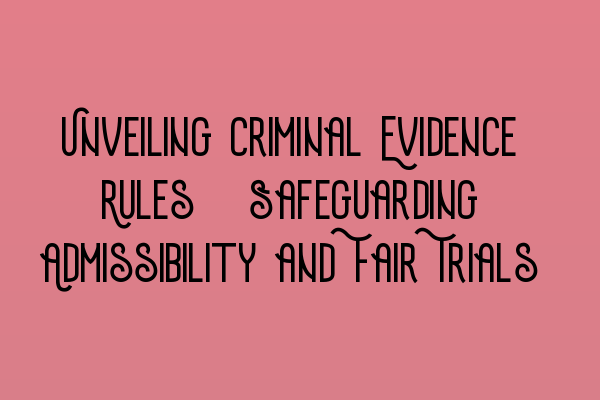Unveiling Criminal Evidence Rules: Safeguarding Admissibility and Fair Trials
The criminal justice system greatly relies on the presentation and evaluation of evidence in order to determine the guilt or innocence of a defendant. It is crucial that the rules governing the admissibility of evidence are followed to ensure fair and just trials. In this article, we will explore the key aspects of criminal evidence rules and the importance of safeguarding admissibility to maintain the integrity of the judicial process.
Understanding Criminal Evidence Rules
Criminal evidence rules dictate the standards and procedures for the admission of evidence in criminal cases. These rules are put in place to ensure that only relevant and reliable evidence is considered during trial, preventing the use of biased or unreliable information that could influence the outcome of the case.
Before evidence can be presented in court, it must pass the admissibility test. This test requires evidence to meet certain criteria, such as relevance, reliability, and fairness. The relevance of evidence is determined by its ability to prove or disprove a fact that is important to the case. Reliable evidence is one that is trustworthy and accurate. Fairness ensures that the evidence does not violate the defendant’s rights or prejudice the jury.
Admissibility rules also encompass the protection of privileged communications, such as attorney-client privilege or doctor-patient confidentiality. Privileged communications are generally not admissible as evidence, as they are considered confidential and privileged.
The Importance of Safeguarding Admissibility
Safeguarding the admissibility of evidence is crucial to maintaining the fairness and integrity of the criminal justice system. Adhering to the rules ensures that both the prosecution and the defense have a level playing field to present their case.
If evidence that does not meet the admissibility criteria is allowed in court, it could lead to an unfair disadvantage for one party. For example, if the prosecution were to present unreliable or irrelevant evidence, it could taint the jury’s perception of the defendant and lead to an unjust conviction.
Additionally, safeguarding admissibility helps protect individual rights. Defendants have the right to a fair trial, which includes the right to confront and challenge the evidence presented against them. Adhering to strict admissibility rules ensures that defendants have the opportunity to contest evidence that is inadmissible.
Admissibility Challenges in Criminal Trials
While the importance of adhering to admissibility rules is clear, challenges can arise during criminal trials. Both the prosecution and the defense may challenge the admissibility of certain evidence, which can lead to pretrial hearings and legal arguments.
In some instances, the defense may argue that evidence was obtained illegally, in violation of the defendant’s constitutional rights. This can involve issues such as illegal search and seizure or coerced confessions. The court must then determine whether the evidence should be excluded from trial due to these violations.
Other challenges may involve expert testimony, hearsay, or the authentication of evidence. Each challenge requires the court to carefully assess the admissibility of the evidence and determine its relevance and reliability.
Conclusion
In conclusion, criminal evidence rules play a vital role in safeguarding admissibility and ensuring fair trials. Adhering to these rules is essential for maintaining the integrity of the criminal justice system and protecting individual rights. By understanding the criteria for admissibility and the challenges that can arise, legal professionals can navigate the complexities of evidence presentation and evaluation effectively.
SQE 1 Practice Mocks FLK1 FLK2
